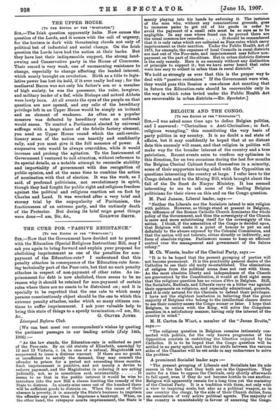BELGIUM AND THE CONGO.
(To MI EDITOR Or TR. Brno...v.1 SI11,—I was asked some time ago to define Belgian politics, and I answered: "Clericalism v. Anti-Clericalism; in fact, religious wrangling," this constituting the very basis of party politics in my country. It is no doubt a sad state of affairs, but it may confidently be hoped that at no distant date this anomaly will cease, and that religion in polities will make way for the broader interest of the country and a true patriotism. Recent events seem to confirm my optimism in this direction, for on two occasions during the last few months the Belgian Clerical Cabinet found themselves in a minority, some of their supporters having sided with the Opposition on questions interesting the country at large. I refer here to the Congo debate and to the Mining Bill, which brought about the fall of the De Smet de Naeyer Ministry. It has seemed interesting to me to ask some of the leading Belgian politicians for their views on this and on the Congo question.
M. Paul Janson, Liberal leader, says
"Neither the Liberals nor the Socialists intend to mix religion with politics. However, as things stand at present in Belgium, the influence of the Roman Catholic Church dominates the whole policy of the Government, and thus the sovereignty of the Church is more and more substituting itself for the sovereignty of the nation. I think, if the annexation of the Congo is decided upon, that Belgium will make it a point of honour to put an end definitely to the abuses exposed by the Colonial Commission, and that the nation will not tolerate, either directly or indirectly, any form of absolute r&gime. Parliament means to keep an efficient control over the management and government of the future colony."
M. Ch. Woeste, leader of the Clerical Party, says
"It is to be hoped that the present grouping of parties will not become permanent. It is the practically general desire of the Catholics to see their old unity re-established. The elimination of religion from the political arena does not rest with them. As the most absolute liberty and independence of the Church are guaranteed by the Constitution, it would at first sight seem that the religious question has no raison (Mrs in Belgium. Still, the Socialists, Radicals, and Liberals carry on a bitter war against their opponents on religious, and especially educational, grounds, and it is only natural for the Clericals to defend their privileges. I have not the slightest hesitation in believing that the great majority of Belgians who belong to the intellectual classes desire to see their country annex the Congo sooner or later. I hope that Belgium, in unison with the King, will solve the Congolese question in a satisfactory manner, having only the interest of the country in mind."
M. H. Carton de Wiart, a member of the "Jenne Droite," says
"The religious question in Belgium remains intimately con- nected with politics, for the only known programme of the Opposition consists in restricting the liberties enjoyed by the Catholics. It is to be hoped that the Congo question will be settled in no party spirit, and that the strife between the various sides of the Chamber will be set aside in any endeavours to solve the problem."
A prominent Socialist leader says
"The present grouping of Liberals and Socialists has its sole reason in the fact that they both are in the Opposition. They unite for a time to oppose the Clericals, only shortly afterwards to fall apart, even if they do not become hostile to one another. Religion will apparently remain for a long time yet the mainstay of the Clerical Party. It is a tradition with them, not only with a view to inspiring souls, but also as a political weapon, as in our country the clergy, by the side of their Church duties, form an association of very active political agents. The majority of the country is unmistakably in favour of annexing the Congo. Difference of opinion only exists as regards the conditions of the taking over, as the 'King shows a tendency to keep to himself too large a share in the administration of that colony. There is no doubt that mutual concessions will bring about an understanding. Those who will vote in favour of the annexation will belong to all parties. It is a national question. Belgium is getting to understand more and more that expansion abroad by 'trade and colonies is a vital question, as is shown by her economical situation and history.'
As will be seen, opinion sometimes varies according to the party to which the statesman formulating it belongs; but it is evident that all, Liberals, Clericals, and Socialists, are equally in favour of taking over the Congo. At least on this point Belgium will act with unanimity.—I am, Sir, &c.,
HENRI LIVALETTE.







































 Previous page
Previous page